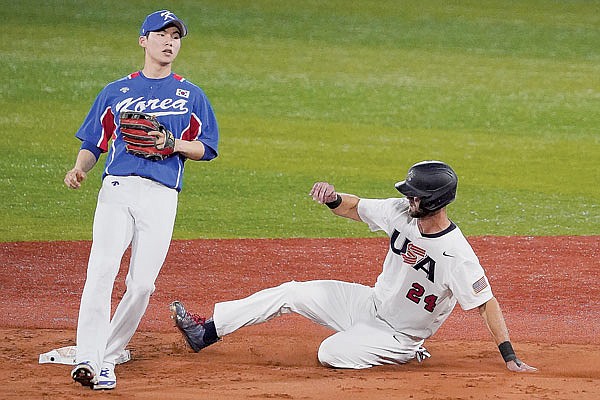He hasn't played up to the lofty expectations.
Not expectations for the Royals, certainly not those of Royals fans, and more than likely not his.
But Bubba Starling stuck with it and baseball gave him something back Saturday for that tenacity.
Starling was the No. 1 draft pick in 2011 by Kansas City. The Gardner, Kan., native went No. 5 overall and was considered to be the No. 1 overall athlete in the draft that year. He also was a top-ranked quarterback prospect coming out of high school and had signed to play at Nebraska.
Starling signed with the Royals for a $7.5-million bonus, the largest of the draft that season to help sway him from playing college football.
He was listed among the top prospects in the minors almost from the start, but struggles at the plate knocked him off those lists after his first couple of seasons in the minors.
The words "Starling" and "bust" were starting to be used in the same sentence. And Royals fans couldn't help but look at some the players taken behind Starling in that 2011 draft - future All-Stars such as Anthony Rendon, Francisco Lindor, Javier Baez and George Springer were among the next seven selections that year - and wonder what could have been and what went wrong.
The $7.5-million man was having a $7.50 career. While a very good defensive player in the outfield, Starling could not make enough contact at the plate. In his first five minor-league seasons, he averaged more than a strikeout per game without displaying the power needed to offset that.
But he stuck with it and got off to a good start in the minors in 2019, hitting .310 through 72 games before getting called up to the big-league club.
In 56 games with Kansas City, he hit .215 with four home runs and 12 RBI. And 56 strikeouts. He got another decent run in Kansas City last year, playing in 35 games. He had one home run and five RBI in 59 at-bats, 27 of which ended in strikeouts. He played good defense, but the hitting just wasn't there.
Starling elected to be free agent last fall when he wasn't assigned to the Royals' 40-man roster, only to re-sign with the team on a minor-league deal a short while later.
That made him available to play for the United States Olympic team, made up of players attempting comebacks and minor leaguers not on the 40-man rosters. Starling was the starting centerfielder and drove in two runs in the first game for the United States. But baseball and Starling continued their star-crossed relationship when he was injured after crashing into the wall trying to make a catch in what turned out to be a 7-6 loss in 10 innings to Japan last week. He didn't play again in the Olympics.
But he was among the players awarded silver medals after the United States fell 2-0 to Japan in the gold medal game.
In the past, Major League teams could expand their rosters to as many as 40 in the final month of the regular season, but that has been trimmed to just 28 this year. Starling is hitting .258 with seven home runs and 25 RBI in 27 games this with Triple-A-Omaha. And at the age of 29, those aren't numbers that are asking for a September call-up.
It hasn't been the career the team or the fans or even he expected. But Starling has had the opportunity to play with his favorite team growing up and had an Olympic medal draped around his neck Saturday.
Playing for your favorite team and earning a medal for your country, that sounds like a pretty good baseball career to me. Those are two things he can treasure forever.

